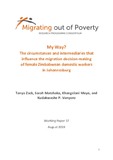| dc.contributor.author | Zack, Tanya | |
| dc.contributor.author | Matshaka, Sarah | |
| dc.contributor.author | Moyo, Khangelani | |
| dc.contributor.author | Vanyoro, Kudakwashe P. | |
| dc.coverage.spatial | South Africa | |
| dc.coverage.spatial | Zimbabwe | |
| dc.date.accessioned | 2019-12-12T15:52:09Z | |
| dc.date.available | 2019-12-12T15:52:09Z | |
| dc.date.issued | 2019-08-01 | |
| dc.identifier.uri | https://opendocs.ids.ac.uk/opendocs/handle/20.500.12413/14873 | |
| dc.description.abstract | The migration of migrant domestic workers, who are mainly female, from Zimbabwe to South Africa is shaped by a number of agents and processes, even though the women exercise substantial individualism and agency in their migration decisions. It is influenced by generational, gendered and economic circumstances, as well as by intermediaries who facilitate the stages of migration. Those intermediaries include brokers with whom the migrant women are socially connected and those who are primarily service providers, even if they also share social connections with the migrants. This study of the migration experience of 40 women found the ease of passage for women once they have made the decision rests in a well-defined mobility pathway. Owing to restrictive immigration controls, the majority of women in the sample fell into irregular migration even if their first arrival in South Africa was regular. Their continued stay in South Africa has been made possible through similarly individualised tactics that tap into social networks and brokers. Furthermore, while domestic workers are legally protected, irregular migrants are at high risk of labour exploitation. The poor oversight of labour conditions in the workplace despite the existence of sound regulation protecting domestic workers in South Africa adds a particular local dimension to precarity of migrant domestic workers. There is a need to stabilise the mobility of these labour migrants through the implementation of a rational, facilitated migration regime. | |
| dc.description.sponsorship | DFID | |
| dc.language.iso | en | |
| dc.publisher | Migrating out of Poverty | |
| dc.title | My Way? The Circumstances and Intermediaries that Influence the Migration Decision-Making of Female Zimbabwean Domestic Workers in Johannesburg | |
| dc.type | Other | |
| dc.rights.holder | University of Sussex. Short sections of text, not to exceed two paragraphs, may be quoted without explicit permission provided that full credit, including © notice, is given to the source. | |
| dc.identifier.externaluri | http://www.migratingoutofpoverty.org/files/file.php?name=wp57-zack-et-al-2019-my-way.pdf&site=354 | |

